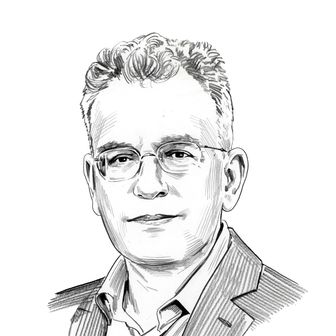
When Blake Bailey met with Philip Roth to interview for the job of his official biographer, the great author asked him how on earth a Gentile from Oklahoma could understand him. Roth, a famously tough customer, had already backed out of a deal with biographer Ross Miller after the project went in a direction he didn’t like. But Bailey — the author of three definitive books about John Cheever, Richard Yates, and Charles Jackson — persisted. By the time Roth died last week at 85, almost exactly six years after their first meeting, Bailey had completed the lion’s share of his work. In the subsequent days, everyone (including me) wanted to talk to Bailey about Roth. I also had other questions: about how the job changes when the subject’s no longer around; how close Bailey got to his prickly subject, and how he’s dealing with Claire Bloom’s extremely unflattering portrait of her ex-husband in the 1996 memoir Leaving a Doll’s House.
What stage has your project reached?
I started writing in December, and I am about 35 percent of the way through. I don’t write a word of finished prose until everything else is in place. I do all the research, and then I spend at least a year organizing things in chapter files and so forth.
But don’t you discover little gaps as you write, and wish you could still call your subject?No, I’m very, very meticulous. I have a 35-page outline, and I really know what every paragraph, more or less, is going to look like. I don’t find that I’ve left anything out, and that makes me very happy. I have too much information. For one, Philip was very proactive; he buried me in boxes of papers — almost up to the ceiling in my office at one time. There’s a warehouse of Philip Roth stuff at the Library of Congress. And I had a predecessor, Ross Miller — bless his heart — so I inherited all of his interviews, and I interviewed 150 people. Plus Philip, many, many times.
Was Roth a saver?
Not in the sense of being a pathological hoarder. He relinquished a lot to the Library of Congress, but things of particular personal nature, he hung onto. Medical records, appointment books — that’s the kind of thing he sent me. As well as three very important items entirely for the biographer: a 300-page chronology, written as casual prose by Philip Roth and read by one person, me. Then there was “Notes for My Biographer,” which Philip was going to publish. It’s really his last book — a rebuttal of Claire Bloom’s memoir practically syllable by syllable. There are two copies in the world. One is in a safe, and one is in my possession. And finally, there’s notes on … can we go off the record for a moment? [Discusses a juicy document.]
While gathering information, were you in touch with Ross Miller, the earlier biographer?
He’s completely dropped out of sight. He would not respond to any of my queries.
The two of them must have fallen out pretty badly.
Oh, yeah.
You said you interviewed Roth many times. Had you become close?
Yes, we had. After we had our first meeting in New York, I went out to Connecticut and stayed for a week, and we had six-hour interview sessions every day. I explained to him that it’s not a good idea to have an intimate friend become your biographer, which is what happened with Ross Miller. There are all sorts of pitfalls, especially when you want to use your biography to get revenge on someone who smeared you in a scurrilous memoir, if you’re following me.
Right.
I explained all the things that on the face of it strike me as disturbing about his relationship with Ross Miller. We had a written agreement, the same agreement that I have with the estates of my previous subjects. And that is that he must cooperate in every reasonable way. He has to allow me to quote freely from letters and other documents. In exchange for which he or his proxies are able to vet my manuscript for factual accuracy — factual accuracy, not for any sort of interpretive stuff.
He has a reputation for ferocity.
Philip doesn’t suffer fools, and Philip is most certainly not a fool himself. But you cannot be around Philip a lot without becoming sentimentally involved, because he’s a very charming, and in many ways a very vulnerable person. So I became very fond of him.
Vulnerable?
He is flayed. The tough-guy public persona was because he’s experienced so much adversity from women, from the Jews, from Claire Bloom, from his best friend Ross Miller, et cetera. And he wants to keep the public at arm’s length. But Philip takes things very, very hard.
When did you last speak with him?
During the first, say, two-and-a-half years of our work, we were in very close touch. Then that tapered off, because he’d given me all he had. The last thing that we really collaborated on was going through tons of photographs from an exhibition at the Newark Public Library for his 80th birthday. It was delicious work to him, a trip down memory lane.
Did you feel at all like you were being nudged or guided into his preferred narrative?
Oh, yeah. Absolutely. Absolutely.
I don’t want to use the word “manipulated,” but …
That’s exactly it. In a given box of stuff that he sent me, and I’m talking a box full of files, each file has a single-spaced, typed memo clipped to it explaining the contents. “Bob Baker and I met at the University of Chicago in 1955,” et cetera. “This is how our friendship progressed and ended,” all that kind of stuff. All of it is skewed toward a self-advocacy, let’s say. I mean, he’s essentially writing his biography by proxy. But in the meantime, I’m also talking to 150 other people, and never mind those who were interviewed before they died by Ross Miller or [Roth’s close friend] Judith Thurman or [oral historian] Harry Maurer. I have all those tapes, and all the letters. I think Philip was making that mighty effort — the effort he brings to everything — to make it come out his way. But I was quietly going my own way.
Did Claire Bloom talk to you?
We emailed and she replied, “All I had to say, I said in my book. It is absolutely accurate.” I noticed, by the way, that last week she appeared on a talk show with her undertaker’s face lamenting the death of Philip Roth. But we agreed I would ask six basic questions. The only one she responded to at all substantially was as follows: When Philip first moved to London in 1977, he came to her townhouse, and he really didn’t know her daughter, Anna Steiger, at all. Well, she had disappeared for three days. They’d called the police, and so on. Finally she shows up, pretends nothing much is amiss. They sit down for their first dinner and all hell breaks loose. And you have to underline this: This is Philip’s version only — and, by the way, it’s in [Roth’s novel] I Married a Communist. So they immediately get in this terrible argument, and Anna begins to pummel her about the head and call her the worst thing she could call her. Whereupon Philip separated them and said, “You cannot ever say that again in my presence.”
So I said [to Claire Bloom] “Did that happen? Did it happen that way?,” the way Philip had reported it. She was furious and categorically denied it. Anna Steiger categorically denied it. And Philip was furious at their denials. He wrote notes about it, which I have, so he wouldn’t forget.
I have one last question for you, a little off topic. I’ve written one biography, and another book that largely centers on one guy. And in both cases, when bad stuff happens in the subject’s life, the act of writing about it was upsetting to me. I’m wondering if you have experienced that.
Yeah, I remember in my Cheever book — poor Cheever cultivated this carapace of affability, and he was all persona toward the end. And he gets cancer. He sits down with his old friend Don Ettlinger — they have this sort of jaunty, joshing friendship — and Cheever blurts out something to the effect of, “I woke up last night and I said, ‘Daddy, Daddy! Help me!’ And I didn’t even have a father when I had a father.” That desperation breaking through — I remember bursting into tears as I was writing that.


